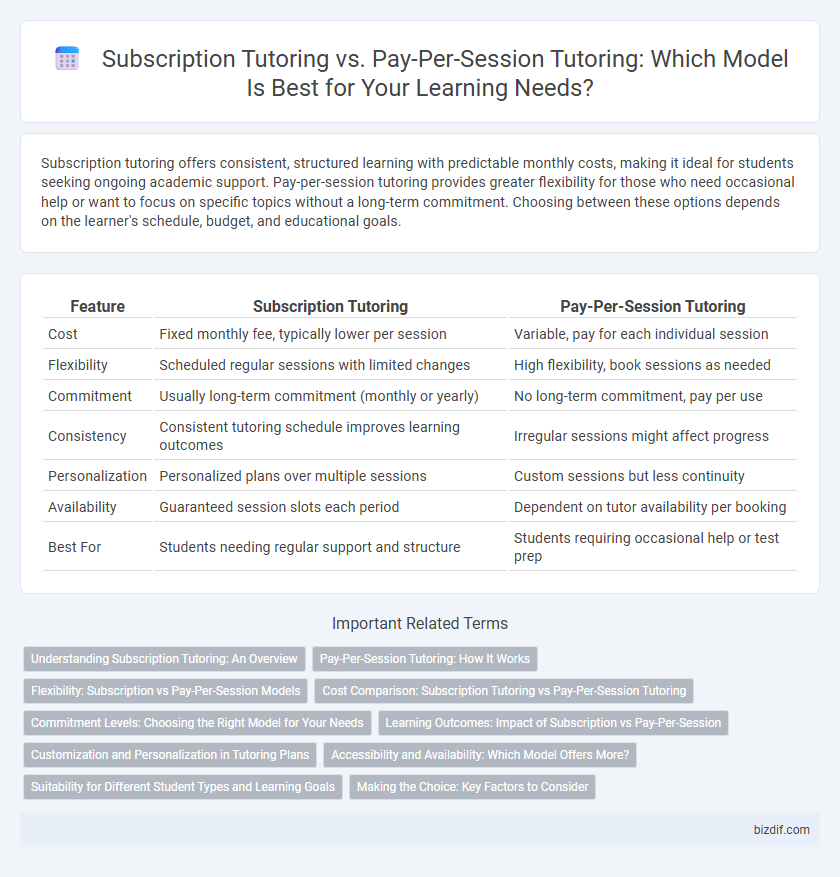Subscription tutoring offers consistent, structured learning with predictable monthly costs, making it ideal for students seeking ongoing academic support. Pay-per-session tutoring provides greater flexibility for those who need occasional help or want to focus on specific topics without a long-term commitment. Choosing between these options depends on the learner's schedule, budget, and educational goals.
Table of Comparison
| Feature | Subscription Tutoring | Pay-Per-Session Tutoring |
|---|---|---|
| Cost | Fixed monthly fee, typically lower per session | Variable, pay for each individual session |
| Flexibility | Scheduled regular sessions with limited changes | High flexibility, book sessions as needed |
| Commitment | Usually long-term commitment (monthly or yearly) | No long-term commitment, pay per use |
| Consistency | Consistent tutoring schedule improves learning outcomes | Irregular sessions might affect progress |
| Personalization | Personalized plans over multiple sessions | Custom sessions but less continuity |
| Availability | Guaranteed session slots each period | Dependent on tutor availability per booking |
| Best For | Students needing regular support and structure | Students requiring occasional help or test prep |
Understanding Subscription Tutoring: An Overview
Subscription tutoring offers consistent, scheduled sessions that promote steady academic progress and deeper subject comprehension. This model typically provides cost savings compared to pay-per-session options, encouraging long-term commitment and personalized learning plans. Regular access to a dedicated tutor in subscription tutoring also enhances accountability and skill mastery over time.
Pay-Per-Session Tutoring: How It Works
Pay-per-session tutoring offers flexible, on-demand access to expert educators without long-term commitments, allowing students to book individual sessions tailored to their immediate learning needs. Sessions can be scheduled quickly through digital platforms, providing personalized instruction in specific subjects or skills at a transparent, upfront cost. This model benefits learners seeking targeted help or test preparation, maximizing convenience and cost-efficiency.
Flexibility: Subscription vs Pay-Per-Session Models
Subscription tutoring offers consistent scheduling and predictable costs, ideal for students seeking regular support and long-term progress. Pay-per-session tutoring provides maximum flexibility, allowing learners to book sessions only when needed without ongoing commitments. Choosing between these models depends on a student's need for routine access or sporadic, targeted assistance.
Cost Comparison: Subscription Tutoring vs Pay-Per-Session Tutoring
Subscription tutoring offers a predictable monthly cost that often results in lower rates per session compared to pay-per-session tutoring, making it more economical for consistent learners. Pay-per-session tutoring provides flexibility without long-term commitment but typically incurs higher costs per hour, which can accumulate quickly for frequent users. Evaluating the total cost relative to the frequency of sessions helps determine the most cost-effective option for individual tutoring needs.
Commitment Levels: Choosing the Right Model for Your Needs
Subscription tutoring offers consistent, scheduled sessions that foster steady progress and long-term commitment, ideal for students seeking structured learning and accountability. Pay-per-session tutoring provides flexibility, allowing learners to engage only when needed, suitable for those with irregular schedules or specific topic focus. Evaluating your commitment level and learning goals helps determine if a subscription or pay-per-session model better supports your academic growth.
Learning Outcomes: Impact of Subscription vs Pay-Per-Session
Subscription tutoring fosters consistent learning habits and better material retention due to regular, scheduled sessions that build cumulative knowledge over time. Pay-per-session tutoring offers flexibility for addressing specific questions or topics but may result in fragmented understanding and less sustained progress. Studies show students enrolled in subscription models often achieve higher academic performance and deeper comprehension compared to those using ad-hoc sessions.
Customization and Personalization in Tutoring Plans
Subscription tutoring offers a highly customized and personalized approach by allowing tutors to track a student's progress over time and adjust lesson plans continuously to meet evolving needs. In contrast, pay-per-session tutoring often lacks this consistent adaptation, as sessions are scheduled independently without a comprehensive roadmap. Personalized tutoring plans within subscriptions enhance learning outcomes by aligning teaching methods and content with the student's strengths, weaknesses, and long-term academic goals.
Accessibility and Availability: Which Model Offers More?
Subscription tutoring provides greater accessibility by offering unlimited or scheduled sessions, ensuring consistent availability for learners who need regular assistance. Pay-per-session tutoring offers flexibility with no long-term commitment but may limit immediate access due to scheduling constraints and availability of tutors. Overall, subscription models tend to enhance continuous learning opportunities, while pay-per-session suits sporadic, on-demand needs.
Suitability for Different Student Types and Learning Goals
Subscription tutoring suits students seeking consistent, structured support and long-term skill development, offering regular sessions and progress tracking. Pay-per-session tutoring fits learners with specific, short-term goals or occasional help, providing flexibility without ongoing commitments. Tailoring the choice to a student's learning style and objectives maximizes educational outcomes and engagement.
Making the Choice: Key Factors to Consider
Choosing between subscription tutoring and pay-per-session tutoring depends on factors like budget flexibility, learning goals, and frequency of sessions. Subscription plans offer consistent support and potential cost savings for students needing regular help, while pay-per-session provides flexibility for sporadic or short-term tutoring needs. Assessing the student's commitment level and long-term academic objectives helps determine which model delivers optimal value and learning outcomes.
subscription tutoring vs pay-per-session tutoring Infographic

 bizdif.com
bizdif.com